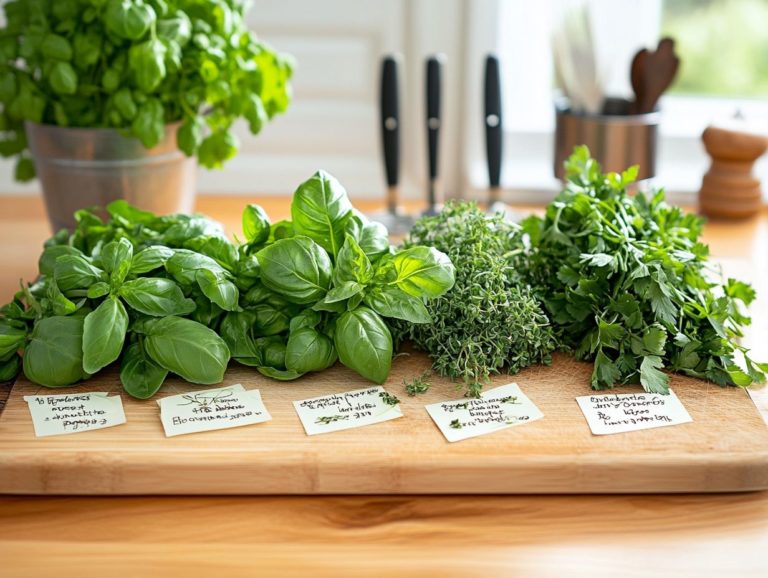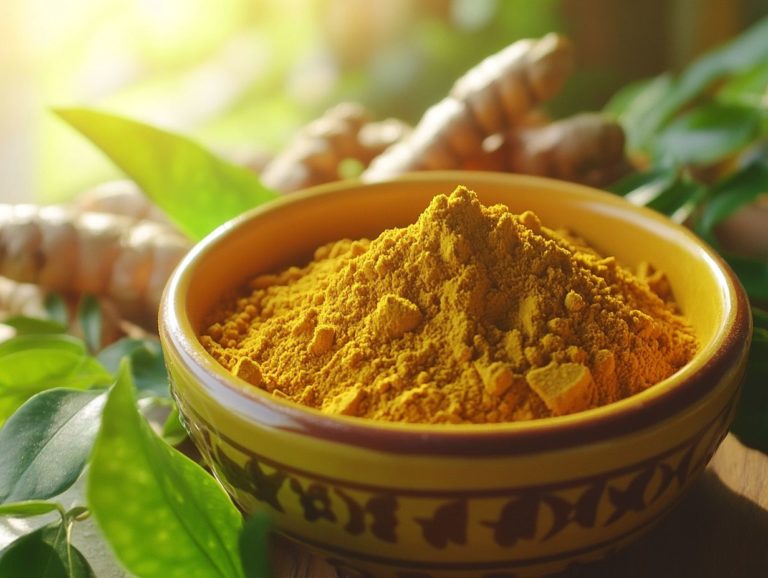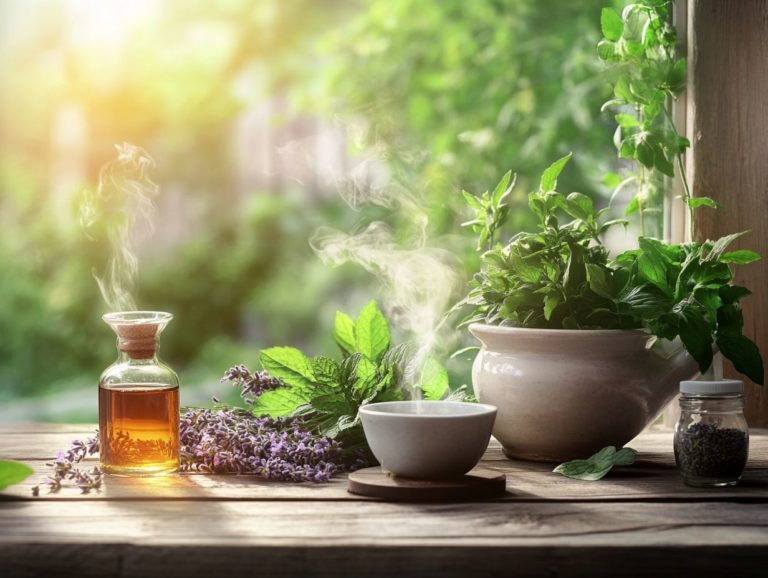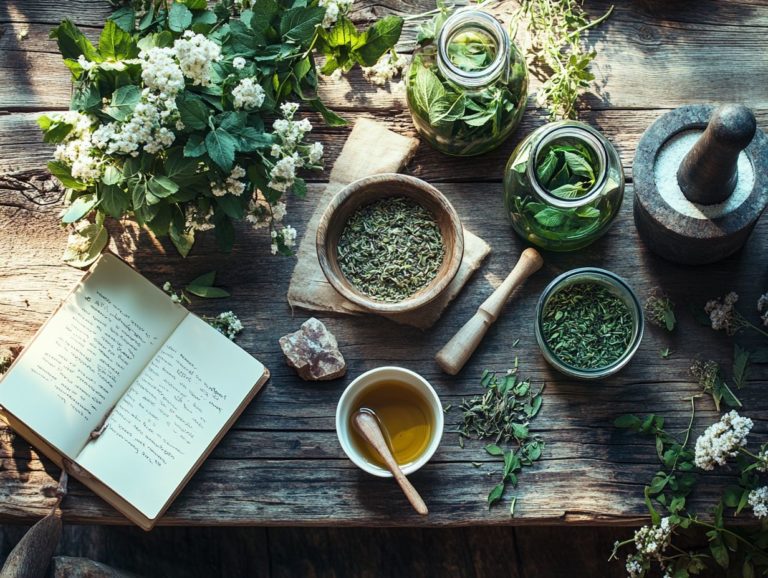5 Lesser-Known Herbal Remedies to Explore
In a world that increasingly prioritizes holistic health, herbal remedies present a refined alternative to traditional medicine.
Consider the calming effects of Ashwagandha on stress or the potent anti-inflammatory properties of Turmeric. Each herb boasts unique benefits that are truly worth delving into.
Discover five amazing herbal remedies that can boost your health! This article will detail their uses and offer insights on how to seamlessly incorporate them into your daily routine.
Whether you re grappling with anxiety, digestive concerns, or seeking to support liver health, these herbal solutions could significantly elevate your well-being.
Contents
- Key Takeaways:
- 1. Ashwagandha for Stress and Anxiety
- 2. Turmeric for Inflammation and Pain
- 3. Ginger for Nausea and Digestive Issues
- 4. Holy Basil for Respiratory Problems
- 5. Milk Thistle for Liver Health
- What Are Herbal Remedies and How Do They Work?
- What Are the Different Forms of Herbal Remedies?
- How Can One Determine the Right Dosage for Herbal Remedies?
- What Are the Possible Side Effects of Herbal Remedies?
- How Can One Incorporate Herbal Remedies into Their Daily Routine?
- What Are the Benefits of Using Herbal Remedies Compared to Traditional Medicine?
- Frequently Asked Questions
- 1. What are some lesser-known herbal remedies that I should explore?
- 2. What is ashwagandha and what are its benefits?
- 3. How can ginkgo biloba help with memory and cognitive function?
- 4. What is holy basil and what are its medicinal properties?
- 5. Can milk thistle help with liver health?
- 6. What are the potential uses for valerian root?
Key Takeaways:

- Ashwagandha can help with stress and anxiety, providing a natural alternative to traditional medications.
- Turmeric has anti-inflammatory properties that can help with pain and inflammation in the body.
- Ginger is a natural remedy for nausea and digestive issues.
1. Ashwagandha for Stress and Anxiety
Ashwagandha is a well-known herb that can help with stress and anxiety. Its health benefits have been recognized in traditional remedies for many years.
Originating from India and parts of the Middle East, Ashwagandha contains active compounds known as withanolides, which play a crucial role in relieving stress. By modulating cortisol levels, it gives your body the power to manage stress responses more effectively.
Clinical trials show that Ashwagandha can significantly reduce anxiety and enhance overall well-being, affirming its revered status in holistic practices.
Its prominent role in Ayurvedic medicine speaks volumes about its ability to promote mental clarity and emotional balance, underscoring how ancient wisdom resonates with modern scientific discoveries.
2. Turmeric for Inflammation and Pain
Turmeric, renowned for its active compound curcumin, is celebrated for its remarkable ability to reduce inflammation and alleviate pain.
Recent scientific studies validate these ancient beliefs, showing that curcumin possesses strong anti-inflammatory and antioxidant properties. Research indicates that this compound can inhibit various inflammatory pathways and lower markers of inflammation in your body.
With roots tracing back thousands of years, turmeric has served not just as a culinary spice but also as a crucial element in Ayurvedic and traditional Chinese medicine. Today s studies spotlight its potential applications for conditions like arthritis, metabolic syndrome, and heart disease.
3. Ginger for Nausea and Digestive Issues
Ginger is widely celebrated as a powerful remedy for nausea and digestive disturbances, making it a cornerstone of herbal remedies.
Historically, the use of ginger stretches back across diverse cultures, particularly in Asia and the Middle East. Its active compounds, like gingerol and shogaol, are responsible for its remarkable anti-inflammatory and antiemetic effects.
Research shows that ginger can effectively alleviate symptoms of indigestion, bloating, and even irritable bowel syndrome.
In traditional cooking, ginger shines in a variety of dishes, from fiery curries to comforting teas, showcasing its versatility and culinary charm.
Numerous scientific studies back these claims, reinforcing ginger’s revered status in both folk medicine and contemporary health practices.
Explore these herbal remedies further and consider consulting a healthcare provider for personalized advice, including popular naturopathic therapies to explore.
4. Holy Basil for Respiratory Problems
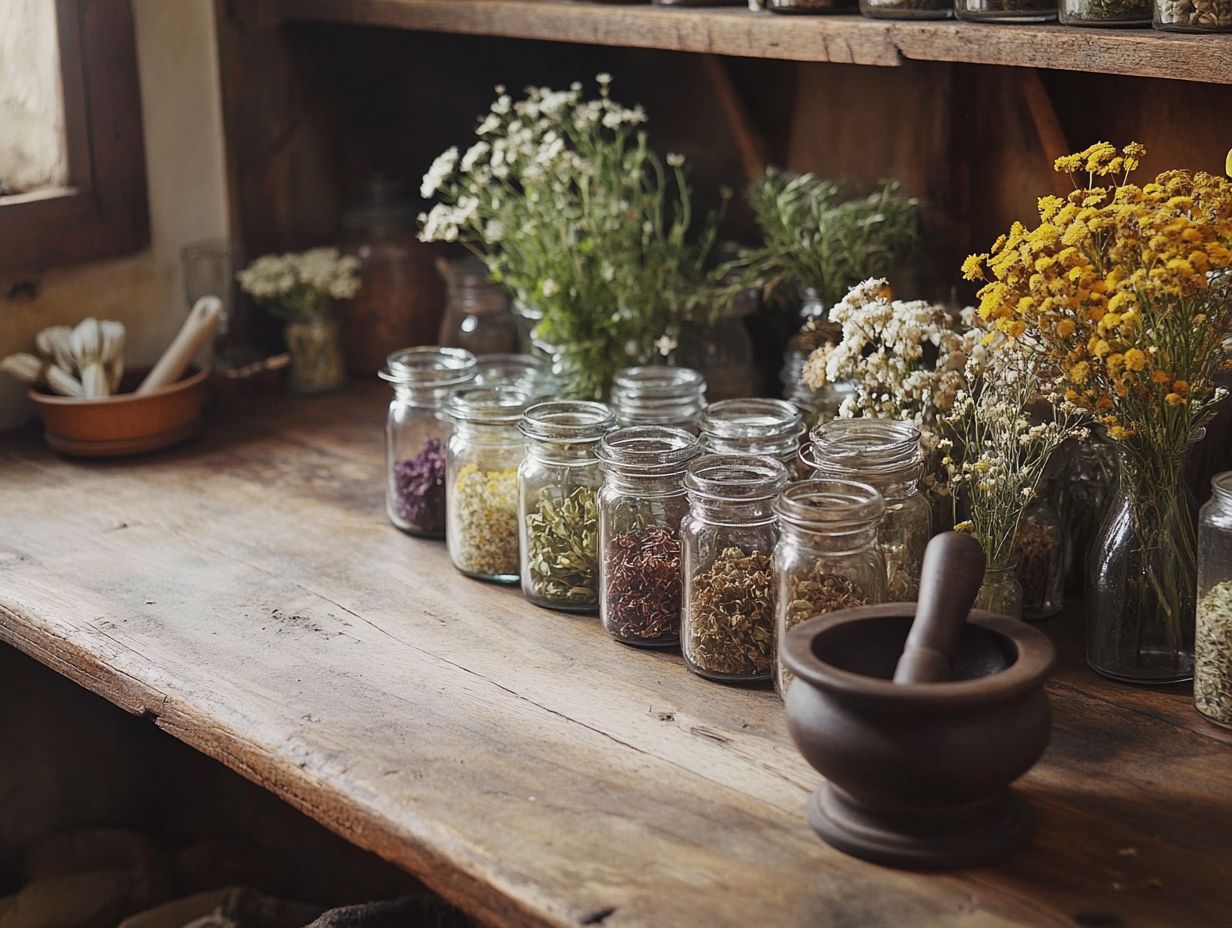
Holy Basil, commonly known as Tulsi, is an ancient herbal remedy that can be particularly beneficial for respiratory issues and overall well-being.
This esteemed herb comes in many forms: teas, extracts, and powders. Each is packed with therapeutic properties.
These compounds serve crucial functions in alleviating respiratory conditions such as asthma, bronchitis, and the common cold. They act as natural anti-inflammatories that soothe your airways and bolster your immune system.
Scientific studies support its effectiveness, reinforcing its historical role in traditional remedies while revealing its potential to enhance lung function and reduce oxidative stress.
By embracing these insights, you can see how this time-honored remedy integrates seamlessly into contemporary holistic health practices.
5. Milk Thistle for Liver Health
Milk Thistle is a gem in the study of medicinal plants, recognized for its remarkable protective effects on liver health. It’s often embraced in traditional medicine for its detoxifying and restorative properties.
At the heart of this herbal remedy lies silymarin, a group of compounds in Milk Thistle that supports liver health. Silymarin acts as a formidable antioxidant, expertly neutralizing free radicals that threaten liver integrity.
For centuries, people have turned to Milk Thistle, eager to harness its powerful benefits for liver health. Modern clinical trials have solidified its standing, demonstrating that silymarin can enhance liver function tests and facilitate the regeneration of liver cells in individuals facing various hepatic challenges.
The harmonious blend of ancient wisdom and contemporary research underscores Milk Thistle’s enduring importance in nurturing liver wellness.
What Are Herbal Remedies and How Do They Work?
Herbal remedies stand as a cornerstone of traditional medicine, utilizing the strength of various medicinal plants and their active ingredients to promote health benefits and address common ailments.
This approach intricately weaves centuries-old wisdom with contemporary research methodologies.
These natural solutions provide immediate relief and promote holistic healing, seeking to restore balance within the body a stark contrast to the specific, targeted strategies typically found in conventional medicine.
For example, you might find herbs like echinacea commonly used to enhance your immune system and ward off colds. Ginger is renowned for its efficacy against nausea and digestive troubles.
Scientific studies support these treatments, revealing that certain active compounds can exert measurable effects on health. This has sparked a growing interest in herbal solutions as valuable complements to standard medical practices.
What Are the Different Forms of Herbal Remedies?
Herbal remedies present themselves in a delightful array of forms tinctures, extracts, teas, and capsules each crafted to unlock the therapeutic potential of plant compounds.
These options cater to your unique preferences and therapeutic needs, making it seamless to weave them into your daily routine.
Take tinctures, for example. They are concentrated liquid preparations made by soaking herbs in alcohol or vinegar, easily administered with a dropper for precise dosages.
Extracts operate on a similar principle but may use water or glycerin, offering a versatile alternative for those who prefer to steer clear of alcohol.
Teas, those warm, comforting brews, are among the simplest preparations you simply steep dried herbs in boiling water, often selected for their soothing properties.
Capsules, on the other hand, provide a discreet way to consume measured amounts of powdered herbs, perfect for an on-the-go lifestyle.
Each method has its strengths and weaknesses. While tinctures can be absorbed quickly, their taste might not be everyone’s cup of tea. Conversely, teas are gentle and palatable but may require larger volumes to achieve the desired effectiveness.
Specific herbs like echinacea, valerian root, and ginger frequently appear across these preparations, each targeting various health concerns.
How Can One Determine the Right Dosage for Herbal Remedies?
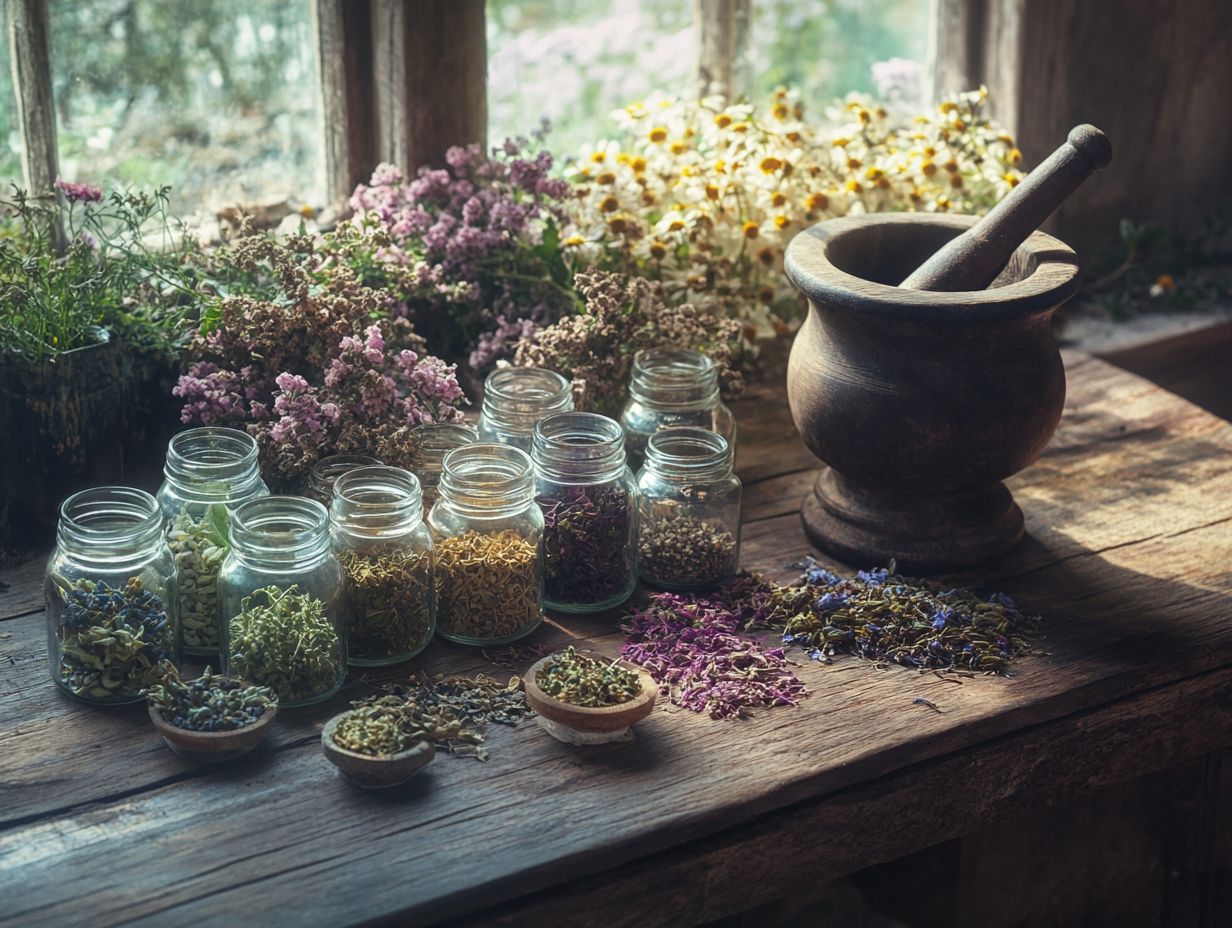
Determining the right dosage for herbal remedies is crucial for maximizing their benefits. At the same time, it minimizes potential risks. This often means seeking guidance from a qualified healthcare provider who understands the active ingredients involved.
Several key factors play a role in this process. These include your age, weight, and existing health conditions. For example, older adults may metabolize certain herbs differently than younger individuals. This may require dosage adjustments.
Your weight can also impact how your body absorbs various herbal components. Specific health issues might interact with herbs, influencing their effectiveness and safety.
Always consult a healthcare provider to customize recommendations specifically for you. This ensures personalized care and optimal results from your herbal treatments.
What Are the Possible Side Effects of Herbal Remedies?
While herbal remedies often appear as natural and safe alternatives, they can have side effects. These vary based on the active ingredients and individual responses. This highlights the importance of thoroughly understanding these remedies before incorporating them into your alternative therapy practices.
Common side effects may include gastrointestinal discomfort, allergic reactions, or interactions with prescription medications. This highlights the need to think carefully before adding these remedies to your health regimen.
Factors like dosage, preparation methods, and your unique health conditions can significantly impact the safety and efficacy of these natural options. It’s essential to consult healthcare professionals to understand how specific herbal compounds might interact with your current treatments or influence your overall well-being.
Your health deserves that level of attention and care.
How Can One Incorporate Herbal Remedies into Their Daily Routine?
Incorporating herbal remedies into your daily routine can significantly enhance your overall health and well-being. This allows you to tap into the benefits of traditional medicine while navigating modern life.
Consider options like chamomile tea for relaxation before bedtime or turmeric supplements for their renowned anti-inflammatory properties. These natural solutions can seamlessly fit into your day.
Topical applications such as aloe vera gel can effectively soothe skin irritations. Enjoying a simple herbal bath infused with eucalyptus can melt away stress.
Small changes can create big results in your wellness journey! Even a small habit, like savoring ginger tea each morning, can effectively kickstart your digestion and invigorate your vitality.
Don t wait start incorporating these remedies today for a healthier you!
What Are the Benefits of Using Herbal Remedies Compared to Traditional Medicine?
Herbal remedies offer a wealth of benefits compared to traditional medicine. They provide a holistic approach to health, usually have fewer side effects, and rely on natural treatments honed over centuries in diverse cultures.
You might find that herbal options reduce costs and make treatments more accessible. This shines a light on remedies that often go unnoticed.
For instance, turmeric is celebrated for its anti-inflammatory properties. It serves as an effective alternative to NSAIDs, often lowering the risk of gastrointestinal issues. Similarly, ginger can alleviate nausea without the unwanted side effects linked to pharmaceuticals.
These natural treatments can be tailored to your needs, allowing for a personalized care approach that respects your body s unique biochemistry. This level of individualization frequently boosts satisfaction and enhances overall well-being.
Frequently Asked Questions
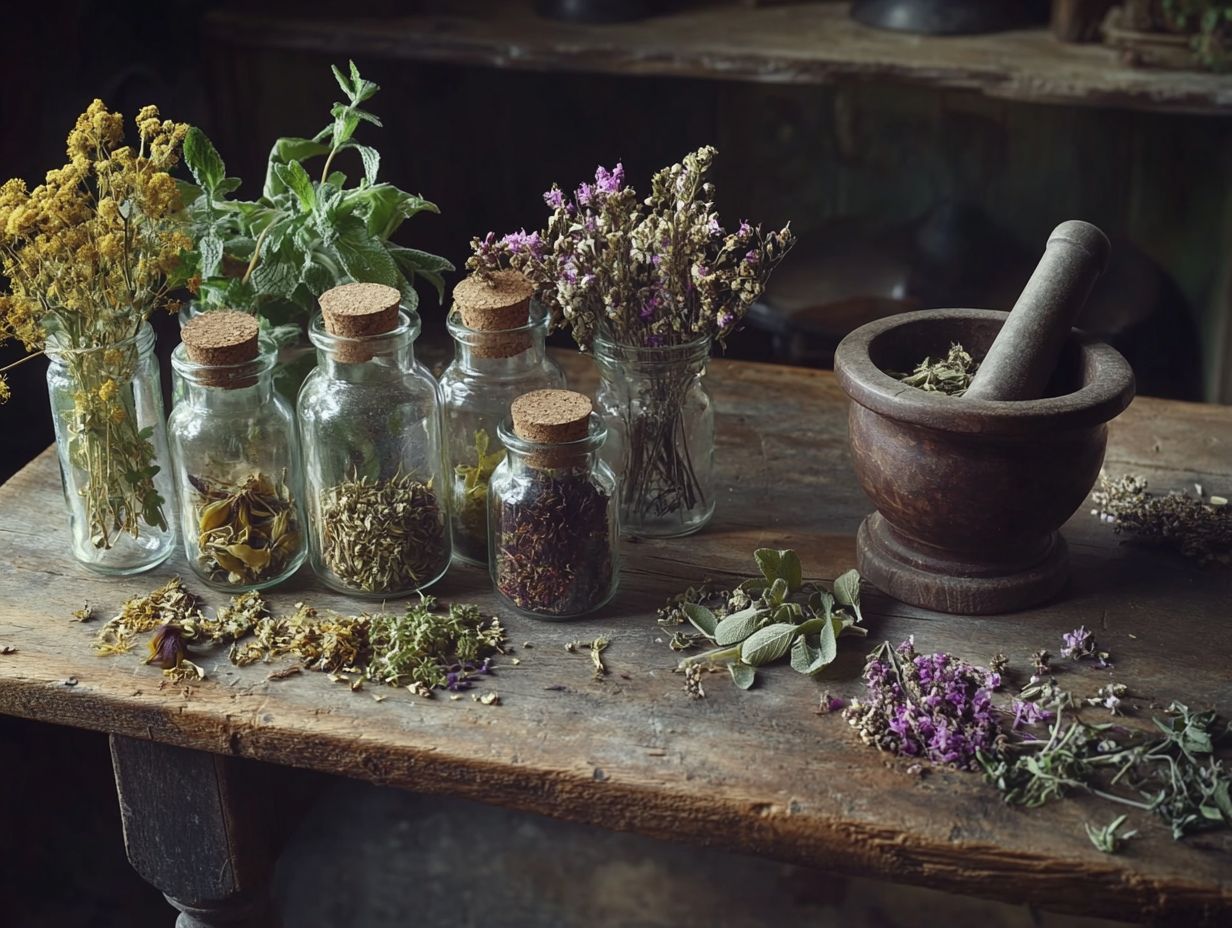
1. What are some lesser-known herbal remedies that I should explore?
Explore some lesser-known herbal remedies like ashwagandha, ginkgo biloba, holy basil, milk thistle, and 5 lesser-known homeopathic remedies.
2. What is ashwagandha and what are its benefits?
Ashwagandha is a popular herb in Ayurvedic medicine. It improves mental and physical health by reducing stress and anxiety while boosting immunity.
3. How can ginkgo biloba help with memory and cognitive function?
Ginkgo biloba has been used for centuries to enhance memory. It increases blood flow to the brain, improving focus and overall cognitive function.
4. What is holy basil and what are its medicinal properties?
Holy basil, or tulsi, is an herb used in traditional Indian medicine. It has powerful anti-inflammatory, antibacterial, and antifungal properties.
5. Can milk thistle help with liver health?
Yes, milk thistle supports liver health and has been used for centuries. Its key component, silymarin, protects the liver and enhances its function.
6. What are the potential uses for valerian root?
Valerian root is known for its calming and sedative effects. It’s often used to promote relaxation, aid sleep, and relieve anxiety.


